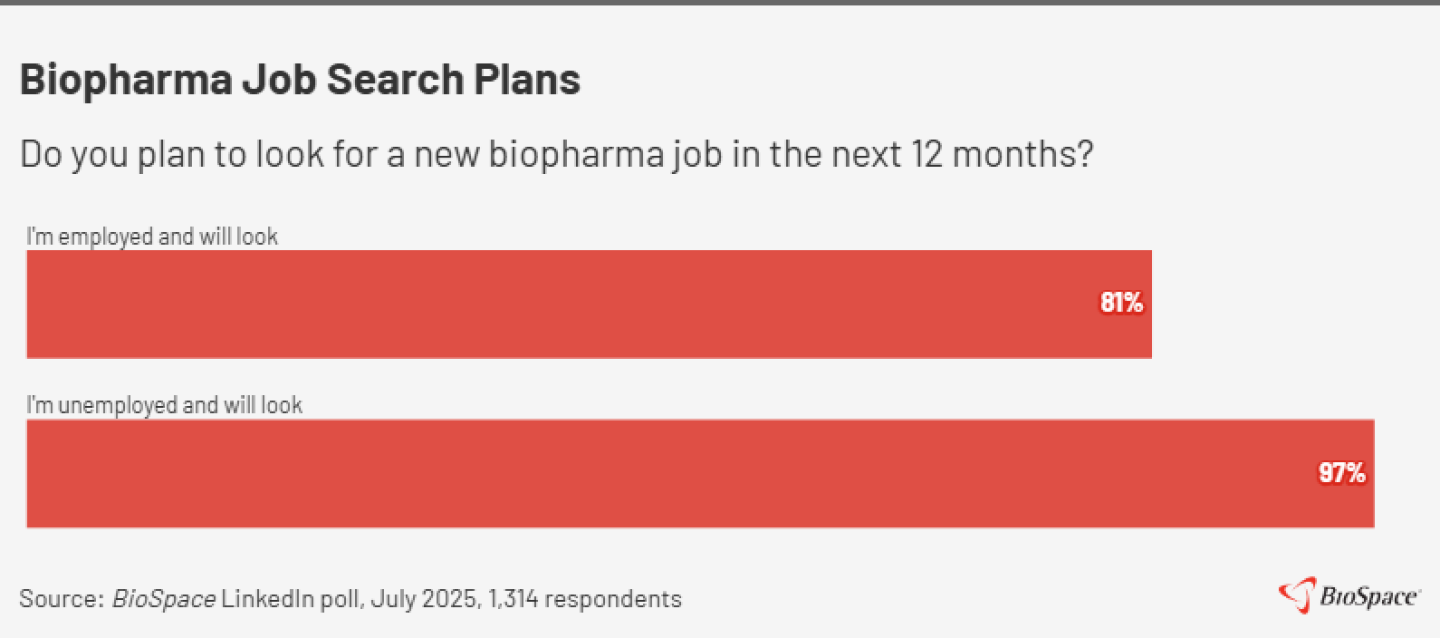Employed biopharma professionals are highly likely to look for new jobs in the next 12 months, although not quite as likely as their unemployed counterparts, according to a BioSpace LinkedIn poll. Three recruitment experts discuss the findings and what’s driving job searches.
Most biotech and pharma professionals who have jobs are hoping for different ones soon, based on a new BioSpace LinkedIn poll. Eight out of 10 employed respondents (81%) said they plan to look for a new biopharma position in the next 12 months. Nearly all unemployed respondents (97%) had the same idea.
For employed and unemployed respondents combined, almost 9 out 10 (88%) expect to search for work soon.
Those numbers are significantly higher than what a new Bankrate survey reported. It found that 48% of respondents who were working full time or looking for full-time employment are likely to search for new jobs in the next 12 months.
BioSpace’s findings did not surprise three recruitment experts: Bryan Blair, vice president of life sciences at talent solutions firm GQR; Lori Rouleau, founder of biotech recruiting firm Truss Group Life Science; and Steve Swan, CEO of The Swan Group, an executive recruiting firm.
Blair, for example, told BioSpace, “I would say that just about every person I am speaking to, even current hiring managers I work with, are looking for greener pastures elsewhere.”
He said nearly all conversations with hiring managers about filling positions also involve asking him to look out for positions for them as well. That started happening in late 2023 and has been on an upward trajectory since then, Blair noted.
He also shared that so far in 2025, although he’s posted about 23% fewer openings on LinkedIn year over year, he’s received roughly 60% more resumes for those positions. In addition, Blair said, senior-level biopharma professionals who normally don’t look for jobs or get them after being recruited are now reaching out and asking about opportunities.
Rouleau has also seen a shift in behavior around job openings. She told BioSpace that when she contacts people about open roles, they’re more open to talking now than they were roughly three years ago. Before, she said, those same people would have said, “I’m good where I am.”
Like Blair, Swan has seen an uptick this year in people contacting him looking for biopharma jobs. While he did not quantify it, he told BioSpace the increase has been much higher than expected.
What’s Driving Job Searches: Layoffs, Job Dissatisfaction
Multiple factors are driving employed biopharma professionals’ job searches, according to Blair, including concern about being laid off. Through the first half of 2025, 130 companies let go of at least 13,000 employees, based on BioSpace tallies.* Those numbers exclude contract development and manufacturing organizations, contract research organizations, tools and services businesses and medical device firms.
So far in July, companies have let go of over 1,350 biopharma employees.
Swan echoed Blair’s comments about layoffs driving employed biotech and pharma professionals to look for other positions. He noted that job security is a big reason for those whose companies don’t get—or are waiting a long time for—drug approvals, are running out of money or are being acquired.
“Who knows what that means for their future, right?” he said, adding that biopharma is facing even more uncertainty than other industries.
Another reason some employed biotech and pharma professionals are looking for new positions, according to Blair, is they’re working so many hours because their companies are running lean that they’re unhappy with their jobs.
Rouleau noted that some want to make a change to get more of an opportunity for professional growth or to make an impact. Regarding the latter, she explained that those who go into research to cure people want their work to mean something to someone.
“What can I do that is going to move the needle to find a cure?” Rouleau said. “What can I do that will benefit the most people?”
If they don’t feel they can make an impact at their company, she noted, they’ll look elsewhere.
Whether the Trump administration’s recent actions, including cutting budgets and workforces at federal agencies and announcing incoming pharma tariffs, play a role in job searches may depend on who you ask. Rouleau, for example, shared that funding cuts at the National Institutes of Health and National Institute on Aging affect early research startups hurting for cash investments. Whether or not those companies cut employees, layoffs are at the forefronts of everyone’s mind, she said.
“They’re feeling insecure,” Rouleau said. “Even if they’re gainfully employed, they’re feeling insecure. Not everyone, but the small, early-research startups are having a really challenging time.”
Blair, however, said he’s hearing fewer people than expected tie their job searches to the Trump administration’s recent actions. He noted that among the clinical and research and development professionals he works with, there seems to be a disconnect between the effect of macroeconomic policy and why, for example, companies can’t get money from private investors.
“I know that that’s something that frustrates the investors is that they don’t understand what keeps the lights on and that it’s not just about making life-saving medicine,” Blair said. “There’s no business to make life-saving medicine if you don’t make a profit.”
*To tally layoffs, BioSpace compiles data for known workforce reductions. The number of employees affected is identified or estimated primarily through information in company press releases, Worker Adjustment and Retraining Notification (WARN) Act notices, SEC filings and other media outlets’ reports or via confirmation from company officials. Not all companies disclose downsizing, and some share only the percentage of staff affected. Some biopharmas provide total numbers retrospectively rather than disclosing individual workforce reductions as they happen.
Want more job market insights? Subscribe to Career Insider to receive our quarterly life sciences job market reports, career advice and more.







